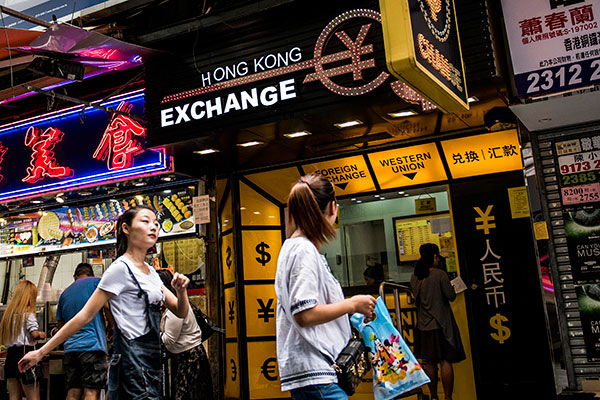'Fluctuations are linked to dollar'
Updated: 2015-08-29 07:20
By Chen Jia(China Daily)
|
|||||||||||
|
 Pedestrians walk past a money changer in Hong Kong. The new market-oriented system of setting the daily trading reference rate is being seen as a significant move toward a free-floating exchange rate, and is also part of the nation's efforts to better reflect global market developments. [Photo/Agencies] |
Economists are insisting that recent global financial market sell-offs should not be blamed on the depreciation of the Chinese currency.
Stock markets in New York, Tokyo and Europe have been fluctuating since Aug 20, just after strong hints by the United States Federal Reserve that it planned to hike interest rates and return the US economy to a more normalized monetary policy.
The yuan's sudden depreciation, however, happened 10 days earlier than the start of those wild swings, and should not be blamed as the fuse which sparked the sell-offs, said Ding Zhijie, an assistant to the president of the University of International Business and Economics in Beijing.
Commodity prices, especially for oil, have tumbled too under the effects of a stronger dollar. Monetary easing by the European Central Bank and the Bank of Japan have further fueled the greenback's appreciation.
The expected hike in rates by the Fed has also drained capital from emerging markets and reduced their foreign exchange reserves, said Ding.
Kazakhstan's tenge, the Thai baht and Vietnam's dong have all depreciated significantly against the dollar since the beginning of the year, decreasing in value particularly in the past fortnight.
Shen Jianguang, chief Asia economist at Mizuho Securities Asia Ltd, stressed the global market turmoil was largely caused by conditions surrounding the US currency and anticipation of the rate hike, and that the yuan's depreciation should not be seen as the scapegoat.
The more than 3 percent depreciation in the yuan against the dollar was accompanied by a new system for setting the daily trading reference rate.
The new market-oriented system of valuing the currency is being seen as a significant move toward a free-floating exchange rate, and is also part of the efforts to better reflect global market developments, according to officials.
"A freely used yuan will support the currency in its efforts to join the International Monetary Fund's Special Drawing Rights basket, and the reforms are due for final review in November," said Shen.
Premier Li Keqiang said on Tuesday there was no longer any basis for continued depreciation of the yuan, and the exchange rate will be kept basically stable.
"It is also wrong to interpret the depreciation as a 'competitive currency war'," Shen insisted, adding that in the view of most economists, global concerns about the health of the Chinese economy had been over-exaggerated.
"China's policy moves so far have been prudent, the amount of monetary supply reasonable, and the country's investment, trade and the international balance of payments are stable. Thus the economic and financial risks are still under control," said Ding.
Related Stories
Foreign exchange rates in Singapore 2015-02-23 17:29
Free trade zone ready for deepening reform on foreign exchange 2015-02-13 08:41
Net foreign exchange sales 'no problem' 2014-09-26 08:22
China's funds for foreign exchange drop unexpectedly 2014-09-16 09:22
The problems of settlement and foreign exchange supervision in the international trade between China and Russia 2014-08-27 16:33
Today's Top News
Hundreds die as desperate migrants head for Europe
Why China will have a 'soft' landing
All creatures great and small help keep V-Day parade safe
Class: Worlds apart, but
learning together
Ministry denies troops sent to reinforce DPRK border
Property investment rules eased
Apple may launch new iPhones at Sept 9 event
Hungary scrambles to confront migrant influx
Hot Topics
Lunar probe , China growth forecasts, Emission rules get tougher, China seen through 'colored lens', International board,
Editor's Picks

|

|

|

|

|

|






